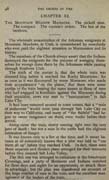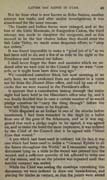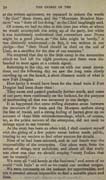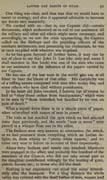
[p. 48]
THE MOUNTAIN MEADOW MASSACRE.
The picked nine. The compact. The captain's orders. The lust of the brethern.
The wholesale assassination of the Arkansas emigrants at Mountain Meadows, in Utah, is remembered by everybody who ever paid the slightest attention to Mormonism and its history.
The members of the Church always assert that the Indians destroyed the emigrants for the purpose of avenging themselves for wrongs done them by the Arkansans while passing through Southern Utah.
The truth of the matter is, that the whole train was doomed long before it reached the Rocky Mountains; for as soon as it was discovered by some Mormons who made their acquaintance "on the plains," that there were some parties in the train bearing the same names as those of men who had engaged in hostilities against the Mormons during their expulsion, news was sent to "headquarters" in Salt Lake City.
It had been rumored around to some extent, that a "train of mobocrats" would soon pass through Salt Lake City on their way to California, and many of "the faithful" had begun to swear vengeance on them, even weeks before their arrival.
Along came the train, slowly moving right into the very jaws of death; but not a man in the outfit had the slightest intimation of danger.
It was known only to a few at the time, and it never became at all extensively known that a plot was laid to "use them all up" before they reached Utah. In fact, there were three separate and distinct plans arranged for their massacre before they entered Salt Lake Valley.
The first one was arranged to culminate at the Sweetwater Crossings, and a party of Mormons and Indians watched for three days and nights for an opportunity to attack them to advantage; but the plan was abandoned on account of the large number of men in the train, and the excellent management of the leaders of the train.

[p. 49]
Not far from what is now known as Echo Station, another attempt was made, and after similar investigations, it was abandoned for the same reasons.
The Danite and Indian forces were enlarged, and at the foot of the Little Mountain, in Emigration Canon, the third attempt was made to slaughter the emigrants, and as this seemed to be the last chance before they should enter the Salt Lake Valley, we made some desperate efforts to "obey our orders."
It was found impossible to make a "good job of it," as we had been told to do, and a few of us rode in the night to the Presidency and reported our failure.
I shall never forget the fears and anxieties which we endured after we were told in the Council that we were "cowards, or it might have been done long ago."
We considered ourselves fated, but next morning, at an early hour, we were awakened from our slumbers in a room not far from the Deseret News office, and told by one of the clerks that we were wanted in the President's office.
It appears that a consultation lasting through the entire night had been held in the Historian's office near by, and it was finally decided that in case a certain number of us would pledge ourselves to "carry the thing through" before the train left Utah, we were to be forgiven.
While disguised as an Indian in one of the attacks before mentioned, I had been wounded in the thigh by a bullet from one of the guns of the Arkansans, and as it was suggested that such a pledge ought to be signed, it was agreed on, and to make the bond the more impressive, it was ordered by the Chief of the Council that it be signed with "blood from that wound."
A pen which had been used in ordinary ink (in fact, it was one which had been used to indite a "General Epistle to all the Saints throughout the World," as I remember seeing the document lying on a table in the room) was pressed into the wound, and a sufficient quantity of ink adhered to write one of the names, and so on the process was repeated until that terrible compact was sealed.
While the Chief was sealing the envelope containing this document, we were ordered to draw our bowie-knives, and placing the blades in contact, so that the points were aimed

[p. 50]
at the written agreement, we repeated in unison the words "By God" three times, and the "Mountain Meadow Massacre" was "done all but doing," as the Chief laughingly said.
Of course, we had no idea at this time just when or where we would accomplish the using up of the party, but while it was indefinitely understood that somewhere near Provo might be a good place, as "the lake might be handy," it was distinctly understood—in fact, it was written in our pledge—that "their blood should be shed on the soil of Utah, as a sacrifice for the sins of our enemies."
We returned that day to the little camp in the mountains which we had left the night previous, and there were disbanded to meet again at a certain signal.
Returning to the city, we went on with our usual avocations, and the following day we saw the long train slowly crawling up on the bench, a short distance south of what is now Fort Douglas.
How lucky it would have been for the fated train if Fort Douglas had been there then!
They came and passed gradually further south, and some of our party were continually on the lookout, for the purpose of ascertaining all that was necessary to our design.
It so happened that some trifling disputes arose between the members of the train and the Mormon settlers along the line of travel, and a strong feeling of hatred grew up on account of these little misunderstandings; which, of course, we, as the prime movers of the enterprise, did not omit to enlarge upon in our interest.
As the story has been so often told, I shall content myself with the giving of a few points never before made public, trusting to my readers to find other sources for details.
Nine of us had been selected, and in our hands was the responsibility of the enterprise. Our plans were, from the nature of things, very indefinite, and about all that really was clear was that we should employ "every Indian that can be trusted."
We were all "old hands at the business," and some of us could "talk Injin" as well as we could our mother tongue.
We were constantly on the lookout for opportunities, and yet it seemed almost impossible to find a suitable place and time.

[p. 51]
One thing was clear, and that was that we would have to resort to strategy, and also it appeared advisable to increase our forces very materially.
We carried with us—that is, our Captain did—certain documents, which authorized us to call to our assistance all the military and other aid which might seem necessary, and accordingly, as we saw the crisis approaching, the Captain called on the Bishops and the presiding officers of the southern settlements, and presenting his credentials, he was at once supplied with whatever was required.
As he has gone beyond all further harm, it may not be out of place to say that John D. Lee (the only real name I shall mention in this book) was one of the men who came to our assistance on the influence of the papers carried by our Captain.
He was one of the last men in the world who was at all fitted to bear the blame of that affair. His complicity was of a trifling nature compared with men who to-day live, and some others who have died without punishment.
In his heart old John revolted, I believe, but of course he had to "obey those orders from headquarters," which were to be seen by "those intended, but handled by no one, on pain of death."
What a mystic force there is in a simple piece of paper, when subscribed with names of men in power!
The train at last reached the spot which we had selected some days previously, and the words "now or never" were passed in a whisper from one to the other.
The Indians were very anxious to commence the attack, as we had promised them everything which an Indian delights in, from whisky to "pretty white squaws," and we came very near to failure on account of their impetuosity.
About forty Indians and nearly one hundred Mormons were engaged in the affair, and probably five hundred of the members of the Church, who did not take actual part in the slaughter, contributed willingly by the loaning of guns, pistols, horses, etc., to those who did the deed.
Nothing in my experience can equal the scene immediately after the massacre. For a long distance the whole valley was covered with the dead bodies of men, women and

[p. 52]
children, presenting the most sickening and horrible sight imaginable.
In several instances the Indians captured women, and after glutting their animal appetites, severed the heads of the victims from the bodies, and left them, in some cases, a mile away from the scene of the massacre.
Some of the Mormons even outdid the Indians in their horrid lust. One of them, I remember, boasted to me that he had captured five of the young women, and forcing them into a wagon, compelled them to submit to the outrages of himself and "others of the brethern," who afterwards "shot them through the head."